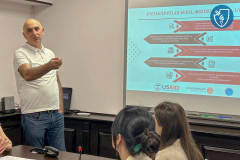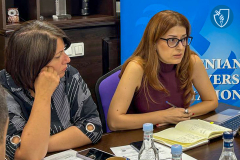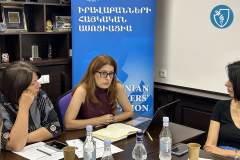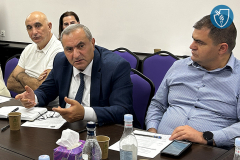On September 13 of this year, a discussion was held at the central office of the Armenian Lawyers’ Association to improve the financial viability of CSOs within the framework of the “Comprehensive Promotion of CSO Financial Viability in Armenia” project. The project is implemented by the Armenian Lawyers’ Association within the framework of the “Active Civil Society” program funded by the United States Agency for International Development, which is implemented by Counterpart International in cooperation with the Urban Sustainable Development Foundation.
The discussion was attended by representatives of civil society organizations, relevant state bodies, international organizations, and experts.
At the start of the meeting, Karen Zadoyan, President of the Armenian Lawyers’ Association, and Magda Avetisyan, Head of the “Active Civil Society” program, welcomed the participants, highlighting the close cooperation between state structures, civil society, and international organizations on this issue.
The meeting then continued with the presentation of the “Comprehensive Promotion of CSO Financial Viability in Armenia” project implemented by the ALA. Karen Zadoyan first spoke about the project’s goals, the actions aimed at their implementation, the policy documents envisaged within the project, and then addressed the results and vision that the project pursues.
“An individual or a state body may be able to provide a solution to one node of the system, but collective efforts are needed to regulate the entire system,” said the ALA President, adding that the key to the project’s success, at the initial stage, is the launch of constructive dialogue, which will become a bridge for CSO-state cooperation.
Project expert Syuzanna Soghomonyan spoke about the provisions of the concept for increasing the financial viability of CSOs, referring to successful international experiences, as well as individual countries’ donation mechanisms, such as Romania, Slovakia, Ukraine, Hungary, Lithuania, and other countries.
“As a result of the studies conducted and planned, as well as upcoming observations and suggestions, it will become clear which country’s or countries’ effective mechanisms are more appropriate to localize in Armenia,” the expert concluded.
During the discussion, CSO sector expert and author of the “CSO Meter” report, Tatevik Margaryan, noted that on this issue, it is very important to show what kind of added value can be created in terms of socio-economic results by providing that 1% of income tax to the public sector.
According to Arthur Manukyan, Deputy Chairman of the State Revenue Committee, when studying international experience, it is important to combine social guarantees, which should be compared with the indicators available in Armenia to get a positive result.
Within the framework of the meeting, a working platform was also formed, consisting of representatives of interested state administration bodies and specialized CSOs, which aims to coordinate the work carried out within the project, to develop continuous discussions and dialogues.
At the end of the meeting, the participants expressed hope that the project and the working platform formed within its framework will have positive results and will serve to increase the financial viability of CSOs.
The meeting was also attended by Hrachuhí Jabagyan, Acting Head of the Non-Profit Organizations Control Department of the SRC, Elena Sargsyan, Chief Lawyer of the Legal Support Department of the Legal Department of the RA Ministry of Economy, Irina Shahumyan and Tehmine Papoyan, representatives of the RA Ministry of Justice, Diana Ter-Stepanyan, employee of Counterpart International, Arpine Hakobyan, President of “NGO Center” Civil Society Development NGO, Armine Podosyan, President of “UN Armenian Association” NGO, Artak Kirakosyan, President of “Civil Society Institute” NGO, Gharib Harutyunyan, President of “Compass” Research, Educational and Consulting Center, Satik Badeyan, representative of “Regional Development and Research Center” NGO, and expert Armen Petrosyan.




















